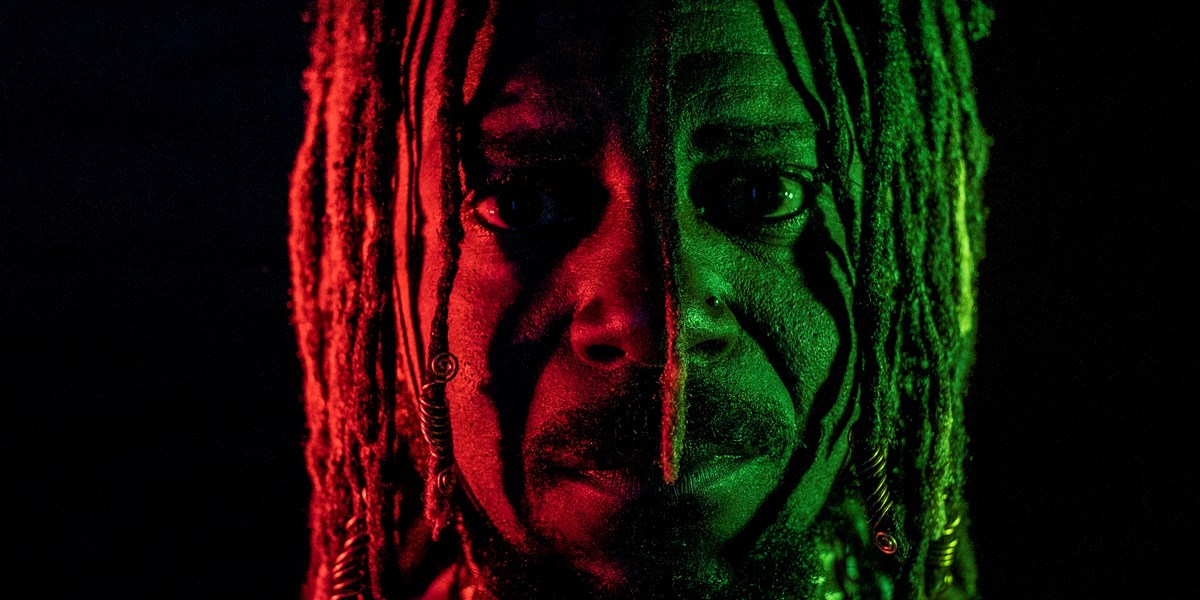Wednesday, April 20, 2022
KOG (Kweku of Ghana): Back to the Afro-Future
Russell Higham catches up with the Accra-born seer Kweku Sackey, who is finally releasing his solo debut after years of collaborations

©Create Not Destroy
Afro-futurism has a new home – in South Yorkshire. The African diaspora’s cultural and artistic reimagining of a better future for black society was first given its musical voice – a collision of spiritual jazz, funk and sci-fi – by the likes of George Clinton, Sun Ra and Jimi Hendrix. These influences are all evident in the infectiously uplifting sounds of Accra-born KOG, real name Kweku Sackey, who moved to northern England with his parents in 2008 to do a law degree. He soon switched careers to music though, after buying his first guitar from a charity shop in Sheffield and hearing other African artists, such as Mim Suleiman, who also live there.
He has since performed at Glastonbury, as frontman for both ONIPA and KOG & The Zongo Brigade, and as part of Damon Albarn’s Africa Express, as well as during his recent Tony Allen retrospective at the Southbank Centre. Jools Holland dubbed him ‘Ghana’s finest’ after his BBC Two appearance on Later… with Afro-disco outfit, Nubiyan Twist, and his vocals have even appeared on a recent FIFA video game. So, perhaps, it’s surprising that he’s only now just releasing his debut solo album.
Speaking at home in Sheffield while preparing for a UK and European tour, Sackey describes how the record “is an ode to my nature, nurture and future.” He says, “I’m an Accra boy from Zone 6 [which lends the album its name]. It’s a breeding ground for talent because people there are well travelled; they’ve been all over, experiencing different influences. But it’s also very traditional. My dad worked overseas as a marine engineer and would bring home albums that I’d listen to; lots of [funk and] jazz like George Clinton and Art Blakey. My uncle worked in the US and would bring me Public Enemy and Prince records too. But then my grandmother, who raised me while my mum was training to be a nurse, would take me to church, where I’d been singing since the age of seven, and I’d listen to roots and highlife music. So, I grew up imbibing these sonic influences. It’s why I’m different from most African artists who just pick up a kora and play nothing but trad. I can bring a kora or tell stories through hip-hop or highlife and paint both worlds for you.”
Kweku explains that, unlike a lot of African music which is male-dominated, his solo release is “a very feminine, maybe even feminist, album. It’s about the women that raised me and gave me a future.” One song on it, ‘Ayinye’, he says, “is about an old woman who would sit outside where we lived in Ghana and was like our security, our CCTV. She had nothing herself, she would just sell food on the street. Like a lot of women, she lived on the periphery of society, but her impact on it was huge. Because there was no crime while she was watching over us: if we did anything naughty, she knew all our names and would tell our parents, so it would make us behave. Lots of my friends turned to crime and some went to prison, but I’m grateful to her for keeping me on a good path and making me who I am.”
Read the review of Zone 6, Agege in the Songlines Reviews Database
This feature originally appeared in the April 2022 issue of Songlines magazine. Never miss an issue – subscribe today

